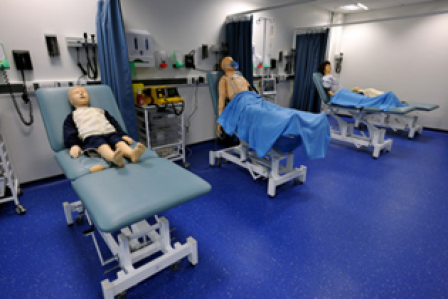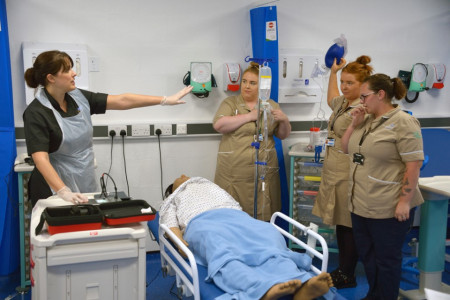
University of Bolton, Deane Road, Bolton. BL3 5AB
Tel:
Email:


“At the University of Bolton, we take great pride in providing a quality, supportive learning environment for our students.”
Professor George E Holmes DL | President & Vice Chancellor
“...tutors are very supportive and you’re not just a student ID number, at this university you are an individual with a name.”
Ellisse Vernon | BSc (Hons) Adult Nursing
Back to menu
Back to menu
Study with an Off-Campus Partner
Back to menu
Back to menu
University of Bolton, why we are the right choice
Location - Bolton, Greater Manchester

07/11/2022
Data from 2022 shows that around 6 million people were waiting to start routine hospital treatment, with A&E and ambulance waits also rapidly increasing.
Of course, the coronavirus pandemic played a huge role in this, with 388,000 people waiting for non-urgent surgery since the pandemic began. A number that had risen from just 1,600 before the start of the pandemic.

Besides this causing a significant surge in demand in the UK health industry, it also provides great employment opportunities for graduates looking to emerge in a rewarding sector. With an operating department practice degree, you can qualify for a life-saving career where no two days are the same. Let’s explore some of the key responsibilities of an operating department practitioner.
What is an Operating Department Practitioner?
When considering how most of an operating department practitioner's (ODP) time is spent, a lot of it involves working in an operating theatre alongside other medical professionals such as surgeons, anaesthetists, theatre nurses, healthcare assistants, theatre support workers, and porters. As an essential member of the operating team, the ODP oversees ensuring that an operation is carried out in a way that is safe and efficient for not only patients, but also the rest of the clinical staff. An ODP also plays an important role in the patient’s welfare after surgery; providing appropriate post-anaesthetic care that continues until the patient fully recovers and is ready to be discharged.
Interested in finding out more about the ODP role? Let’s delve deeper into their responsibilities.
Before Surgery – Anaesthetic
Before entering the operating theatre, you need to feel confident that everything is going to go smoothly; the role of an operating department practitioner before surgery is one of their most vital responsibilities. This is because without being the surgeon who actually puts patients under the knife, the ODP oversees the process of ensuring that the anaesthetic equipment is prepared correctly and safe for use. This is followed up by ODPs being responsible for performing duties such as washing and shaving the surgical site, applying dressings, and monitoring patients’ vital signs.

During Surgery
Now that we’ve understood what an operating department practitioner would do in the lead-up to surgery, let’s look at what an ODP would do during surgery. You might be aware that every head chef needs a sous chef to cook and execute a delicious meal. Well, the same can be said for a surgeon; they need the support of an ODP to complete a successful operation:
- Monitoring the patient’s heart rate or blood pressure
- Taking blood or tissue samples for analysis
- Giving oxygen to the patient to aid their breathing both during and after the operation
Recovery and Post-Anaesthesia
The role of an ODP after surgery refers to the patient's post-operation care; the first few hours after an operation are critical. This means that an ODP is directly responsible for monitoring patients and keeping a close eye on their welfare post-operation. Subsequently, if they were to notice any complications, it would be the role of the ODP to alert the medical team.
When patients are ready to be discharged from hospital, the ODP also has the role of giving instructions on how to best take care of themselves at home.
Why Study Operating Department Practice?
Our BSc (Hons) Operating Department Practice course at the University of Bolton maintains a balance between a surgery's technical and scientific components and the soft skills that enhance communication, well-being, and patient care. Our students have access to our £31 million state-of-the-art facilities that include industry-spec Clinical Simulation Suites; giving them the practical learning experience they need to prepare for a career in the health industry.
The course is designed to prepare our students to demonstrate the confidence, compassion, competence, and effective judgment that is required of a registered ODP. A large part of our students' studies is focused on a clinical placement at one of our partner NHS Trusts; helping you to develop the team-working, leadership, and management skills that will be an essential part of your training. This also complements our student’s academic studies as our supportive learning environment and quality teaching is at the heart of everything we do at Bolton.
Want to find out more? Look at our full course details and find out how you can start your career journey with a BSc (Hons) Operating Department Practice degree.
You can also get the answers to any of your questions about life at Bolton by contacting our award-winning Students Services Team at enquiries@bolton.ac.uk or calling us on 01204 903807.